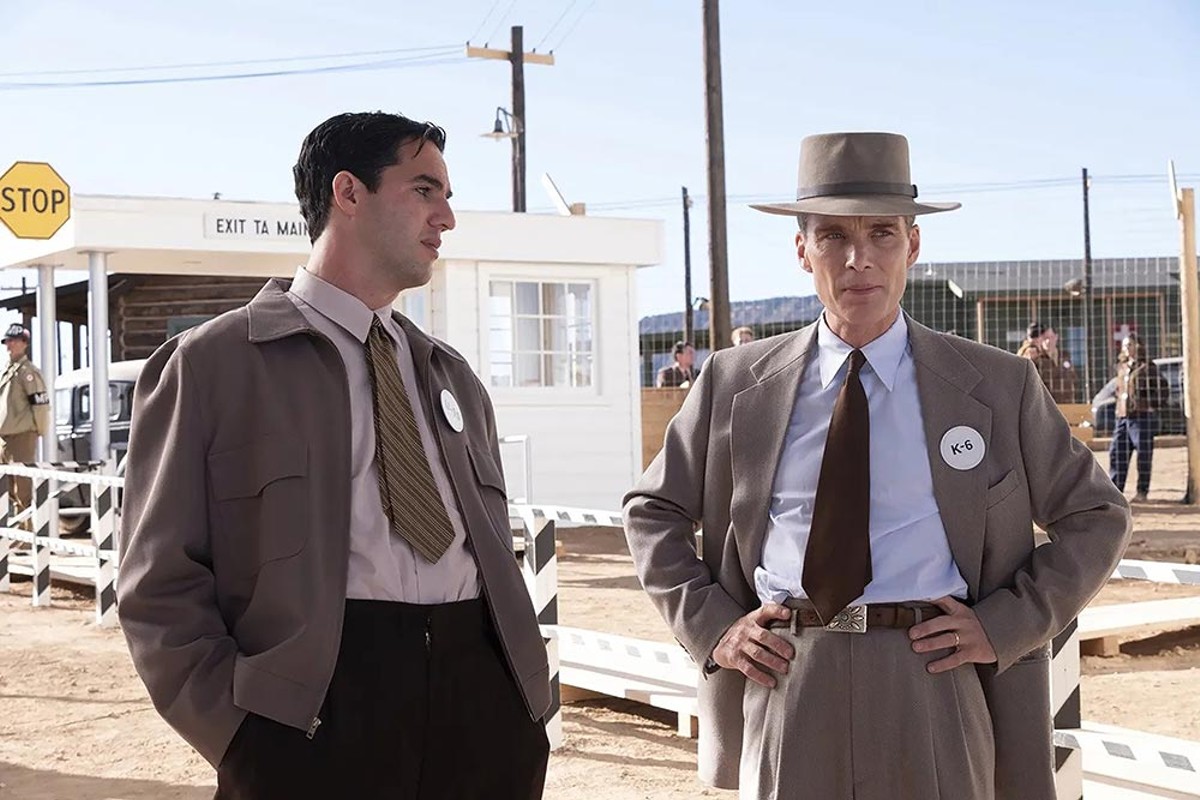Although Oppenheimer is spared Prometheus' physical punishment for that hubristic act — his liver remains safe from endlessly recurring consumption by an eagle — the film devotes much of its three-hour running time to the non-corporeal forms of retribution he suffers: the U.S. government’s Cold War-era accusations of Communist Party membership and possible Soviet spying, and his own escalating concern over the world-annihilating capacity of the weaponry he helped birth. American Prometheus’ subtitle is “The Triumph and Tragedy of J. Robert Oppenheimer,” and Nolan places equal emphasis on both aspects, inextricably entwining them throughout the film.
Film Details
The first concerns the 1954 hearing to determine the renewal of Oppenheimer’s security clearance, where the allegations of his “treasonous” behavior are aired. The second recounts his contentious relationship with Atomic Energy Commission Chairman Lewis Strauss (Robert Downey Jr.), which begins when Strauss offers Oppenheimer the directorship of Princeton’s Institute for Advanced Study in 1947 and culminates in Strauss’ 1959 Senate confirmation hearing as commerce secretary. Nolan helps audiences negotiate this labyrinth by shooting the Strauss “Fusion” sequences in luminous black-and-white, but the film rivals Asteroid City in its daunting structural complexity.
In fact, what’s most remarkable about Oppenheimer — among an array of superlative achievements — is its refusal to simplify, its trust in the audience’s intelligence. That faith may ultimately prove misplaced — recent events amply demonstrate that the American public’s historical and scientific ignorance shouldn’t be underestimated — but I can’t help but admire the film’s bracing assumption of our collective knowledge of physics (or at least its basics), events in the Spanish Civil War and World War II, the Red Scare hysteria, and Cold War nuclear politics.
Partially constructed as a thriller — focused on revelations about Oppenheimer’s postwar tribulations — the film nicely delivers on that superficial level, but it operates more as a rich psychological case study, exploring its subject’s interior thoughts. Nolan actually shows us occasional flashes of what the younger Oppenheimer sees in his mind’s eye: abstract swirls of cosmic matter that serve as precursors to the Trinity test’s disquietingly beautiful atomic detonation. Later, after the U.S. government drops bombs on Hiroshima and Nagasaki, the film reflects Oppenheimer’s increasingly distressed viewpoint — what exactly has he wrought? — by having backgrounds sometimes subtly vibrate and threaten to fracture, and he twice sees nightmarish visions of flesh melting.
Longtime Nolan collaborator Cillian Murphy exquisitely conveys the anxieties and complicated emotions of Oppenheimer, to whom he also bears an uncanny physical resemblance. Instead of the typical hagiographic treatment, the film and actor never heroicize or sanctify Oppenheimer — he always remains condescending, wilful, capricious and self-sabotaging. At his first meeting with Oppenheimer, Manhattan Project Director Leslie Groves (a predictably terrific Matt Damon) offers a succinct and entirely accurate summation of his flaws, and Murphy bravely foregrounds rather than disguises those attributes. Because of Oppenheimer’s prickly behavior and often opaque motivations, we never warm to the character but instead come to admire him only grudgingly.
Nolan takes a similarly sophisticated approach to the many other players in his drama: In a postwar Oval Office meeting, Oppenheimer confesses to President Harry Truman (an unrecognizable Gary Oldman) that he feels as though he has “blood on my hands,” but no one in Oppenheimer emerges entirely clean or sullied. For example, the two principal women in the film — wife Kitty Oppenheimer (Emily Blunt) and lover Jean Tatlock (Emily Pugh) — sometimes act erratically or irresponsibly, but they’re both accorded moments of grace and resolve (with Blunt particularly effective in Kitty’s security-clearance interview). And even the film’s least sympathetic figures — Strauss, security officer Boris Pash (Casey Affleck), interrogator Roger Robb (Jason Clarke), informer William Borden (David Dastmalchian) — largely avoid cartoon villainy: Their motives are scarcely pure, but patriotism (however misguided) and national interest at least partially inform their actions.
Oppenheimer adopts a similarly nonjudgmental attitude toward the knotty moral questions that it addresses with both thoughtfulness and thoroughness. Were Oppenheimer and his team wrong to build the bomb? Despite his fears of Nazi Germany’s own pursuit of nuclear weapons, physicist Isidor Rabi (David Krumholtz) refuses to participate fully in the project because of his ethical concerns, but he then appears at the Trinity test to lend support. Should both (or any) bombs have been dropped on Japan? The film allows Secretary of War Henry Stimson (James Remar) to make a persuasive case, but Oppenheimer seems of two minds: Hiroshima, yes; Nagasaki, no. Should the U.S. expand the arms race by developing the H-bomb? Oppenheimer adamantly opposes that escalation, but Edward Teller (Benny Safdie) and Strauss provide substantial counterweight.
Some will see the film’s avoidance of definitive conclusions as equivocation or both-sidesism, but it again reflects Nolan’s respect for his audience: Oppenheimer is the rare summer blockbuster that demands our active engagement, not our simple-minded acquiescence. And that’s a far more satisfying kind of thrill.
Subscribe to Orlando Weekly newsletters.
Follow us: Apple News | Google News | NewsBreak | Reddit | Instagram | Facebook | Twitter | or sign up for our RSS Feed

















